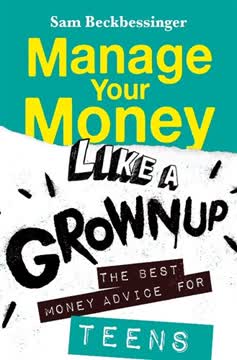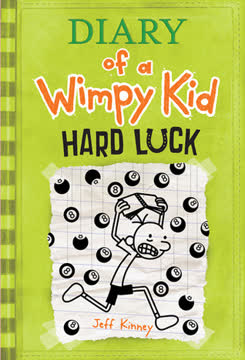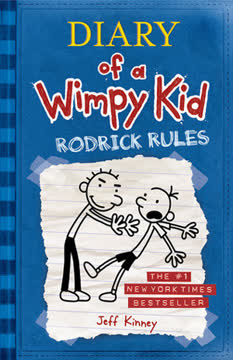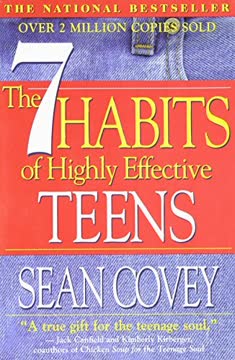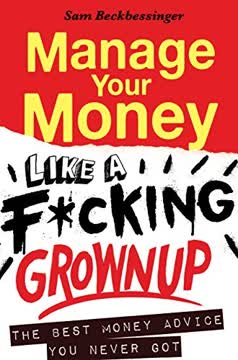Key Takeaways
1. Money is Your Tool for Freedom, Not a Trap
Really, what I want to talk to you about is how to live the life you actually want to live, not the life that the world wants to force you into.
Unlock your dreams. Money isn't just about getting rich; it's about gaining the freedom to pursue your true passions and live the life you envision. Many adults feel trapped by their jobs because they haven't learned to control their money, allowing money to control them instead. Understanding how money works transforms it from a master into a powerful tool, enabling you to support loved ones, pursue hobbies, start businesses, or simply live a stress-free life in nature.
Control your destiny. If you don't learn to manage your money, it quickly slips away, forcing you into a constant cycle of earning. This book aims to equip you with the knowledge to avoid that trap, ensuring you don't spend your entire adult life just making money without enjoying it. By mastering money, you reduce financial stress, freeing up mental space to focus on more enjoyable and meaningful aspects of life.
Start now, not later. You're never too young to begin. The habits you form today—whether managing a R100 birthday gift or a future R1 million salary—are the same fundamental skills. Just as top athletes start training young, early financial literacy builds a strong foundation that won't shake when you're older. Every year you delay saving costs you far more than you think, thanks to the magic of compound interest.
2. Unpack Your Family's Hidden Money Stories
The funny thing about culture is that often it’s invisible to the people who grew up in that culture.
Invisible influences. Every family has a unique "money culture"—unspoken rules and beliefs about money that shape your understanding. These deeply ingrained "money stories" are absorbed from childhood, even if money is never explicitly discussed. They can be helpful or harmful, influencing everything from how you view wealth to your spending habits.
Common money narratives. Researcher Brad Klontz identifies four types of money beliefs:
- Money avoidance: "Rich people are greedy."
- Money worship: "More money will make you happier."
- Money status: "Your self-worth equals your net worth."
- Money vigilance: "It’s important to save for a rainy day."
Understanding which of these stories resonate with you, and how they might contradict each other, is crucial for developing a healthier financial mindset.
Open the conversation. Many families treat money as a taboo subject, leading children to form confusing or unhelpful beliefs in an "information vacuum." By consciously examining your family's money culture—how income is earned, expenses are managed, and allowances are handled—you can gain clarity. This understanding empowers you to reflect on your own beliefs and replace unhelpful ones with more constructive perspectives, ensuring money doesn't remain a mystery.
3. Unleash the Magic of Compound Interest Early
The thing you need to remember is that whenever a pile of money is accumulating interest that is compounded (which is how most interest works) it grows crazy-fast.
Hulk-powered growth. Compound interest is the most powerful financial concept you'll ever learn. Unlike simple interest, which is calculated only on the original amount, compound interest is calculated on the growing total, meaning your interest starts earning its own interest. This creates an exponential "snowball effect," where money grows "crazy-fast" over time.
Time is your superpower. The single most important factor in compound interest is time. The longer your money has to grow, the more dramatically it multiplies. A single cent doubling daily for 30 days becomes R5.3 million. This principle highlights why starting to save and invest as early as possible, even with small amounts, gives you an enormous advantage over those who start later.
Beware the dark side. While compound interest is magical for your savings, it's a monster when it comes to debt. Most loans and credit cards charge compound interest, meaning the longer you take to pay back what you owe, the more the interest itself grows, trapping many in a "debt spiral." Understanding this dual nature of compounding is key to using it to your advantage and avoiding its pitfalls.
4. Build Wealth by Acquiring Assets, Not Just Earning Income
In fact, it turns out that the amount you save is the single most important part of being a grownup with your money.
Beyond cash flow. To truly build wealth and achieve financial freedom, you must shift your focus from just managing "cash flow" (income vs. expenses) to building a strong "balance sheet" (assets vs. debts). Wealthy people have a high net worth, meaning their assets significantly outweigh their debts. The path to wealth involves spending less than you earn and using the difference to acquire assets.
Assets work for you. An asset is something you own that either increases in value over time or generates income for you. Unlike expenses (like a new video game that loses value), assets are like "little side-hustles" that work for you, earning passive income while you relax. Examples include:
- Shares in a business (owning a piece of a company's profits)
- Rental properties (generating income)
- Intellectual property (like a book earning royalties)
Wealth vs. "Rich." There's a crucial difference between being "rich" and being "wealthy." Rich people often spend a lot, owning many nice things, but might be burdened by debt and stress. Wealthy people, conversely, prioritize saving and investing in assets, often appearing less flashy but accumulating true financial freedom. Your goal isn't just to earn a lot, but to keep a significant portion of it and strategically build assets that secure your future.
5. Recognize the World's Unfairness, Then Act
It’s up to your generation to decide what type of world you’re going to build when you’re older.
Unequal starting lines. Life is inherently unfair, and opportunities are not equally distributed. Two identical individuals, one born into wealth and the other into poverty, will face vastly different paths, with the privileged individual having numerous "power-ups" like better education, healthcare, and resources. This "privilege" isn't a fault, but a lucky advantage that makes success significantly easier.
South Africa's stark reality. Our country is one of the most unequal globally, a legacy of colonialism and apartheid. This history has systematically concentrated wealth and power, leaving the majority of black South Africans facing disproportionately high unemployment and lower average household incomes compared to white South Africans. This systemic disadvantage means that poverty is rarely a result of individual failings, but rather a broken system rigged against many.
Your generation's mission. While understanding money helps individual success, it's crucial not to blame the poor for their circumstances. The ultimate goal is to use this knowledge not just for personal gain, but to actively work towards a fairer world. Your generation has the responsibility and opportunity to build a society where children have equal opportunities, regardless of their background, by challenging existing inequalities and advocating for systemic change.
6. Embrace the Entrepreneurial Spirit with Side-Hustles
One of the most important things you might learn in your whole life is that failing is okay.
Beyond allowances. A side-hustle is more than just extra cash; it's a training ground for essential life skills. Being an entrepreneur—someone who runs their own business—teaches you self-reliance, problem-solving, and how to create your own opportunities, crucial in a world where traditional jobs aren't guaranteed. It's about learning to make money by selling goods or services, becoming your own boss.
Failure is fuel. The beauty of starting a side-hustle as a kid is that failure carries minimal risk. Most businesses fail, and this experience teaches invaluable lessons about persistence and adaptation. It's like a video game where you get unlimited retries, allowing you to experiment, learn from mistakes, and develop resilience without the pressure of adult responsibilities.
Match skills with demand. Finding the perfect side-hustle involves aligning your interests and developing skills with what people are willing to pay for. Whether it's tech support, baking, or custom crafts, focus on "productizing" your efforts—creating something you can sell repeatedly. Always calculate your costs and pricing to ensure profitability, remembering that thinking bigger often leads to cheaper production and higher profits.
7. Cultivate Valuable Skills Over Fixed Career Paths
So here’s my advice to you: don’t stress so much about what you want to ‘be’ when you grow up. Rather, focus on honing your skills.
Life's many roles. The question "What do you want to be when you grow up?" is misleading, as you'll embody many roles beyond just a job. In a rapidly changing world, most people will have multiple careers, making a rigid "plan" less useful than a flexible set of skills. Focus on what you can do and what you enjoy, then practice until you're excellent.
Skills are your compass. Developing diverse and rare skills provides options, allowing you to "cross the river by feeling the stones" in an uncertain future. Whether it's problem-solving, creativity, technical expertise, or people skills, these abilities are transferable across various industries and roles. Start building these skills now, perhaps through a side-hustle, as early dedication can lead to mastery.
Happiness beyond income. While money can alleviate stress, beyond a certain point (around R45,000/month in South Africa), more money doesn't significantly increase happiness. Factors like health, relationships, and purpose become far more important. Therefore, choose a career that offers both financial stability and personal fulfillment, rather than solely chasing the highest salary. Prioritize earning "enough" to live freely, then focus on what truly brings you joy and meaning.
8. Master Your Money with the "Envelope" System
Budgeting doesn’t work because you are not the perfectly rational, long-term planning creature you pretend you are.
Outsmart your monkey brain. Traditional budgeting often fails because our brains are wired for immediate gratification, not long-term planning. Instead of a rigid budget, adopt the "envelope system" to create a "gutter-ball protector" for your money. This involves giving every rand a specific "job" by allocating it to different categories, whether in physical envelopes or separate bank accounts.
Allocate with purpose. Your envelopes should reflect your financial priorities. Common categories include:
- Fun Money: For immediate enjoyment.
- Basics: For essential expenses like clothes or toiletries.
- Savings: For specific, larger goals (e.g., a game console).
- Freedom Fund: Long-term wealth building through investments.
- Charity: Money for causes you care about.
A simple starting point could be a "one third for spending, one third for saving, one third for giving" rule, or a mixed allowance where side-hustle money is for saving.
Consistent "Mission Control." To truly master your money, establish a "money mission control" dashboard. This can be a simple notebook, a spreadsheet, or a banking app. Dedicate 10 minutes weekly to a "weekly check-in" (reviewing spending and remaining funds) and 30 minutes monthly to a "monthly action plan" (updating net worth, tracking where money went, and allocating funds). This consistent review helps you understand your habits and make conscious choices, ensuring your money works for you.
9. Invest Smartly to Outrun Inflation and Grow Wealth
Ironically, the most dangerous place to store your money is in cash, under your mattress: not because of kleptomaniac tokoloshes, but because inflation means its value decreases every day.
Inflation's silent threat. While saving is good, inflation is its "nemesis," constantly eroding the value of your money. A can of Coke costing R2 years ago now costs R9 because your rand is worth less. To combat this, you must invest your money, aiming for growth that outpaces inflation. If you're saving for anything more than a year away, investing is crucial.
Shares: long-term power. Investing means buying assets that grow in value or earn income. The stock market, where you buy "pieces" (shares) of successful businesses, is one of the best ways to do this. While share prices "wobble" in the short term, they reliably grow over the long run (historically 7% above inflation in South Africa). This makes shares a powerful tool for long-term wealth building, far outperforming cash savings.
Be a "lazy" investor. The smartest and safest way to invest is often the easiest: passive investing. Instead of trying to pick individual "winning" shares, invest in broad "index tracker funds" that buy a piece of many companies (e.g., the Top 40 or global markets). This diversifies your risk and is typically cheaper and more effective than active investing. Set up automatic monthly investments, ignore market "wobbles," and let compound interest work its magic for decades.
10. Outsmart Advertising's Mind Control for Savvy Spending
There are people out there who are trying to hijack your brain and control your thoughts. I’m not talking about alien invaders or supervillains: I’m talking about advertisers.
The manipulation game. Advertisers spend billions to make you believe you need things you didn't want before. They exploit your brain's "monkey" weaknesses, making you spend mindlessly. Recognize their tactics to resist mind control:
- Anchoring: The first price you see sets your "normal."
- FOMO (Scarcity): "Limited editions" or "sales" rush your decision.
- Herd Mentality: Brands manipulate your desire to fit in.
- Personalization: Targeted ads use your online data.
Savvy spending strategies. To regain control, empower your "front-brain" (the rational, slow-thinking part) over your "back-brain" (the impulsive, excited part).
- Delete advertising: Install ad blockers, avoid malls, skip magazine ads.
- Shop slowly: Research, compare prices, and use a "cooling-off" rule (e.g., wait 24 hours before buying).
- Buy used: Second-hand items are cheaper and better for the environment.
- Focus on total cost: Don't be tricked by low monthly payments on contracts (like cellphones); look at the overall price.
Happiness in small doses. Research shows that buying many small, enjoyable things more often brings greater happiness than one large, expensive purchase. Prioritize experiences and genuine connections over material possessions. Learn to appreciate what you already have, and remember that true fulfillment comes from within, not from external validation through purchases.
11. Use Your Money as a Powerful Force for Good
Every time you give money to a business, you’re casting a vote for the type of world you want to live in.
Give back, feel good. Money is powerful, and you have the choice to use it for good. Donating to charity is one of the simplest ways to make a positive impact, helping those in need or supporting organizations tackling global problems. Research shows that giving to charity is one of the most effective ways to increase your own happiness and feel less powerless about societal issues.
Ethical consumption is a vote. Beyond direct donations, every purchase you make is a "vote" for the kind of businesses and world you support. Research your favorite brands:
- Where is your food grown?
- How are your clothes made?
- Who profits from your gadgets?
Choose to support companies that are environmentally friendly, treat workers well, and contribute positively to their communities. This extends to your investments too; seek out ethical index funds that exclude harmful industries.
Beyond money: get involved. While financial contributions are vital, true change requires more. Educate yourself, share what you learn, and actively participate in local politics and activism. Your unique skills and talents are powerful "weapons" in the fight for a better world. Remember, you're not striving for financial perfection, but for conscious choices that lead to a happier, more meaningful life, both for yourself and for the world around you.
Last updated:
Review Summary
Manage Your Money Like a Grownup receives positive reviews for its accessible approach to financial literacy for young adults. Readers appreciate the kid-friendly explanations, relatable analogies, and cultural insights. The book is praised for simplifying complex financial concepts, making it an excellent introduction for teenagers. Some adult readers find it helpful for basic financial understanding, while others note it's too basic for them. The book's South African context is highlighted as informative. Overall, it's recommended as a valuable resource for teaching children about money management.
Similar Books
Download PDF
Download EPUB
.epub digital book format is ideal for reading ebooks on phones, tablets, and e-readers.
